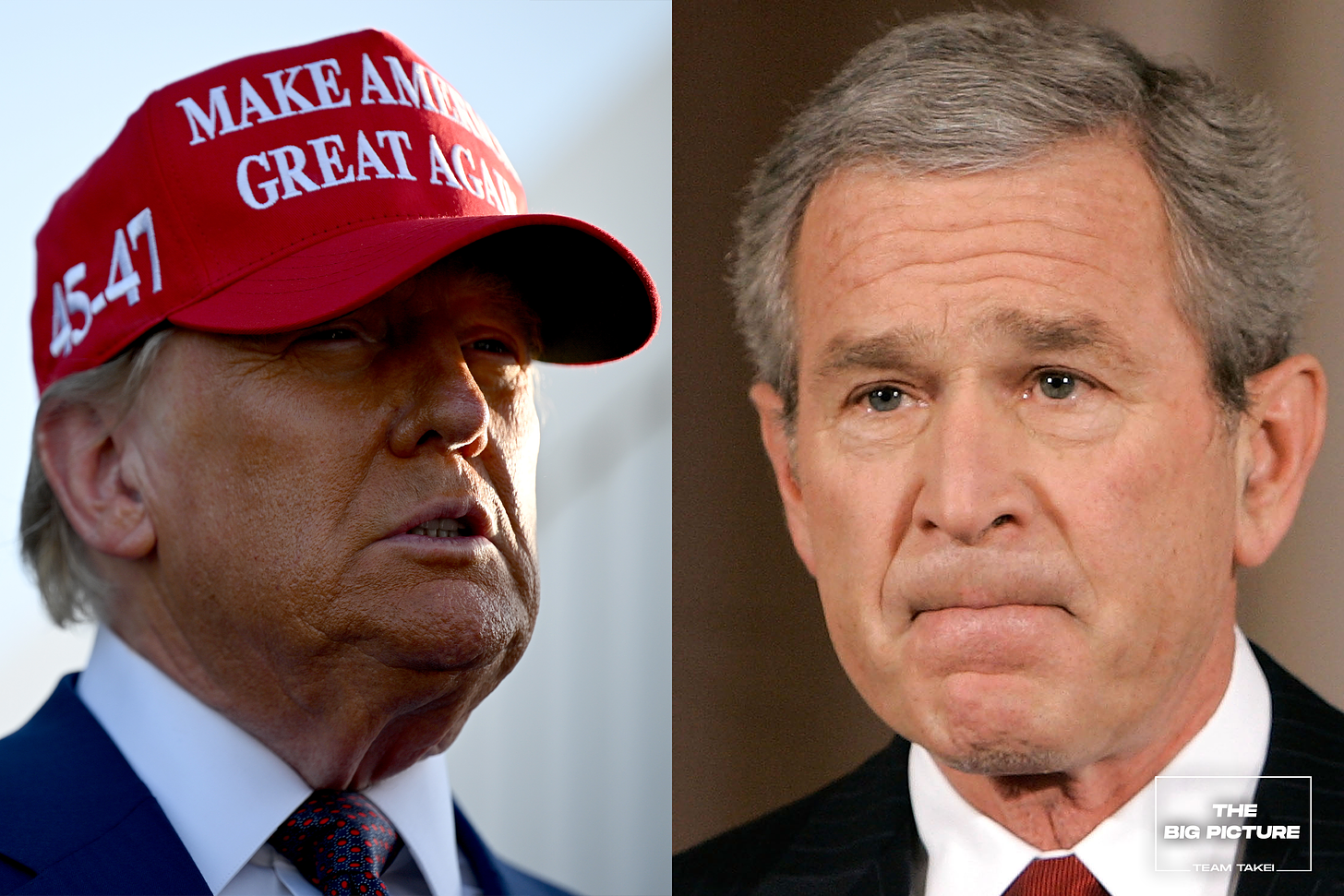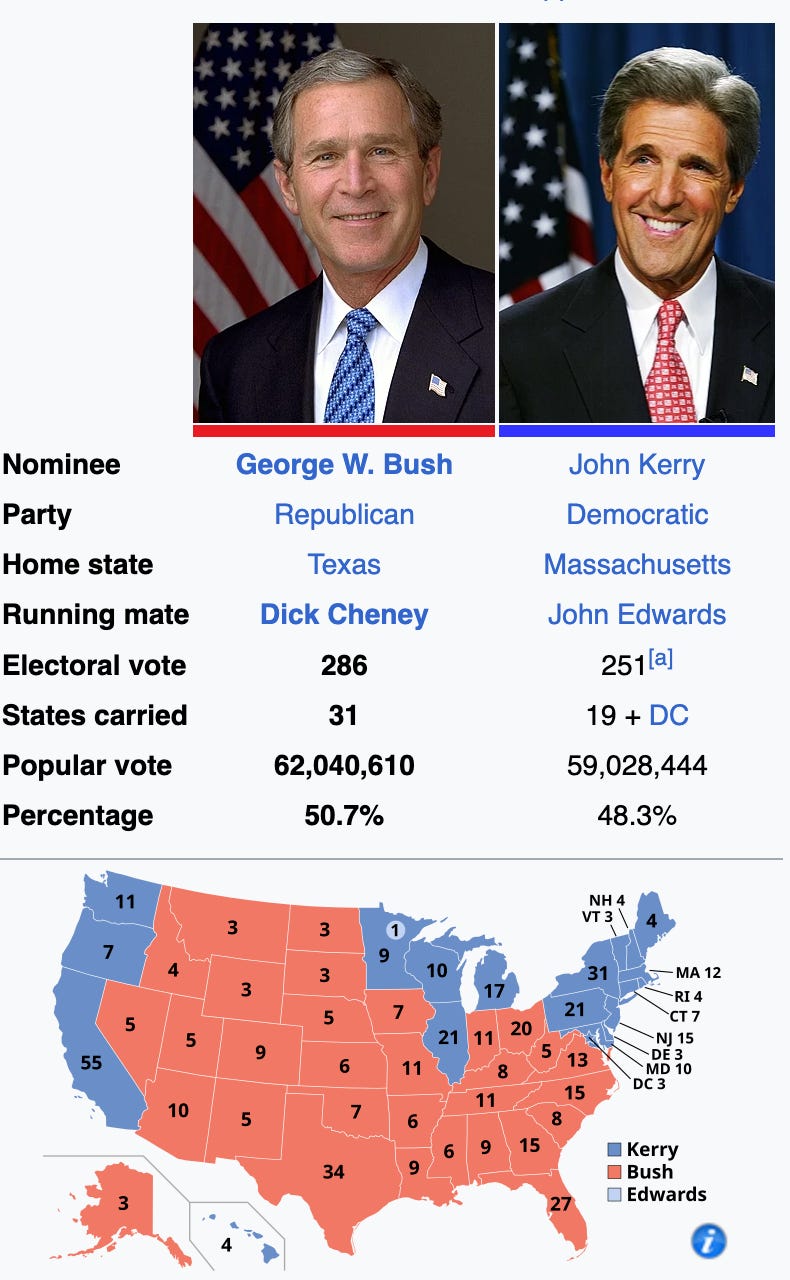Is Donald Trump About To Repeat George W. Bush's Mistake?
The parallels to twenty years ago suggest Democrats may have a big opportunity over the next two years

In the weeks since Election Day, two inescapable facts have emerged about Donald Trump’s victory that make clear his win was hardly the “unprecedented and powerful mandate” he initially claimed.
First, Trump’s popular vote share has dropped below 50%, meaning that a majority of Americans in fact voted against him and for someone else. Second, his vote margin over Vice President Harris has shrunk to a mere 1.6%, smaller than even Hillary Clinton’s popular vote victory in 2016.
Yet, to be fair, this result does mean that for the first time in 20 years, a Republican has won the presidential popular vote. Sad but true.
The last time a Republican won the popular vote was in 2004 when George W. Bush—who, like Trump, won the presidency the first time despite losing the popular vote—eked out a narrow reelection victory over Democrat John Kerry.
Back then, Bush’s 2.4% popular vote victory coincided with a tighter electoral college victory: 286 to 251 (as opposed to Trump’s 312-226.) As with Trump, Bush’s Election Day vote total overperformed his polling lead average. And like Trump, Bush tried to spin a tight election win into a national mandate.
As Bush said at the time:
"The people made it clear what they wanted," he said. "I earned capital in the campaign, political capital, and I intend to spend it."
What Bush proceeded to do remains one of the truly historic miscalculations in modern politics, and it helped fuel a major comeback for Democrats in 2006.
Bush’s attempt to “spend” his so-called political capital was widely seen as a major overreach, and many have suggested that Trump is on his way to a similar misreading of the electorate once he takes office on January 20.
In today’s piece, I’ll explore how Bush overreached 20 years ago and discuss whether Trump is poised to repeat history. I’ll also take a look at what lessons Trump—and Democrats—can learn from Bush’s epic flameout two decades ago.
Bush’s 2005 Social Security Privatization Push
In the wake of his 2004 reelection win, George W. Bush decided he was going to “spend” his “political capital” on privatizing Social Security. Yes, in his mind, winning 51% of the vote in 2004 was a clear sign that the American people wanted an essential element of the U.S. safety net privatized so it would be left to the whims of the markets.
Spoiler alert: It did not go well.
Bush had first floated privatizing the popular government program right after he took office in 2001, even creating a congressional commission to analyze his idea to allow younger Americans to use portions of their payroll taxes toward “voluntary personal retirement accounts.” Despite it going nowhere in Congress, according to the Brookings Institution, Bush
mentioned the issue repeatedly during the 2004 campaign and was able to argue that his reelection represented a mandate to move forward on what he called personal accounts (and his adversaries called partial privatization).
So, then on February 3, 2005, Bush launched a major privatization push during his State of the Union Address, at which he stated:
“As we fix Social Security, we also have the responsibility to make the system a better deal for younger workers. And the best way to reach that goal is through voluntary personal retirement accounts.” This approach, the President argued, would offer younger workers a “better deal.”
But as Brookings hilariously notes:
Within weeks, observers noticed that the more the President talked about Social Security, the more support for his plan declined. According to the Gallup organization, public disapproval of President Bush’s handling of Social Security rose by 16 points from 48 to 64 percent–between his State of the Union address and June.
And crucially:
By early summer the initiative was on life support, with congressional Democrats uniformly opposed and Republicans in disarray.
As Chris Hayes noted in a segment a few weeks ago on MSNBC:
“Democrats on Capitol Hill did something rare: They dug their heels in and they fought Republicans tooth and nail. In fact, one aide to then House minority leader Nancy Pelosi recalls that nervous colleagues would ask her when the party’s alternative Social Security plan would be released and Pelosi responded, ‘Never. Does never work for you?’”
In fact, according to Gallup, in the immediate aftermath of his 2005 State of the Union Address, Bush’s approval rating had reached 57%. By late August it had fallen to a low of 40%. And that was even before Bush’s disastrous response to Hurricane Katrina and the continued unpopularity of his Iraq War debacle. Collectively, these not only rendered Bush’s privatization push DOA and sent his approval rating plummeting below 40% for much of 2006, but they also helped Democrats retake both chambers of Congress in the 2006 midterms with a net gain of 31 seats in the House and six seats in the U.S. Senate.
Is history about to repeat itself?
Trump Is Already Overreaching
If we know one thing about Donald Trump it’s that he likes to declare victory whether he wins or not. But does he actually believe his own spin about a “mandate” or is it just for show, a performative display of strength to overcompensate for his actual weakness?
While Trump’s declaration that his reelection represented a “powerful mandate” seemed driven by the desire to set a narrative and tell a story about what happened in the election, by the look of the last few weeks, as Trump has rolled out unqualified cabinet pick after unqualified cabinet pick, it’s starting to appear that he just might believe his own hype.
Donald Trump’s choice of Matt Gaetz, Pete Hegseth, RFK Jr., Tulsi Gabbard and now Kash Patel represent the sort of hubris of someone who thinks he actually does have political capital to spend.
Likewise, his plans for “Day One” in the White House signal the same.
Per NBC News:
Trump is preparing on Day One to overturn specific policies put in place by Biden, with plans to end travel reimbursement for military members seeking abortion care and to restrict transgender service members’ access to gender-affirming care, two people familiar with the plans said.
But much of the first day is likely to focus on stopping illegal immigration — the centerpiece of Trump’s candidacy. He is expected to sign up to five executive orders aimed at dealing with that issue alone after he is sworn in on Jan. 20, three Trump allies said on condition of anonymity.
Yet just 12% of voters in the 2024 exit polls considered Immigration their top issue and just 14% said the same about abortion. When it came to immigration, just 40% of voters said undocumented immigrants should be deported while 56% said they should be given a pathway to citizenship; and on abortion rights, 65% of voters support abortion being legal.
But still, these are among Trump’s second-term priorities?
As George Packer predicts in his new piece for The Atlantic:
The Trump administration, with a favorable Congress, will overreach on issues such as abortion and immigration, soon alienating important parts of its new coalition. It will enact economic policies that favor the party’s old allies among the rich at the expense of its new supporters among the less well-off. It’s quite possible that, approaching 80, Trump will find himself once more among the least popular presidents in the country’s history.
Robert Reich concurs, predicting that, particularly on economic issues such as tax cuts for the wealthy and tariffs, two of Trump’s signature issues, Trump will…yes, overreach.
“You’ve got no constraint. And when Trump faces no constraint, and when billionaires backing Trump face no constraint, what happens? They overreach, inevitably they overreach. And they’re going to overreach with tax cuts for the billionaire class, for corporations. They’re going to overreach with tariffs and it’s going to cause people to be so angry and upset, that I think there’s going to be a great big response.”
As already noted, the response to Bush’s overreach in the 2006 midterms was fierce, sending Democrats back to the majority in both chambers of Congress after twelve years in the minority. And with an unpopular lame-duck president serving out his final two years of his second term, Democrats would go on to win the presidency in a landslide in 2008 and expand their Congressional majorities further.
So what lessons should we be taking from this?
Lessons George W. Bush Can Teach Us
If there’s one lesson Donald Trump should take away from George W. Bush’s experience in 2005, it is this: Just because you campaigned on something and then won doesn’t mean that thing you ran on is the reason people voted for you.
Trump, however, never has been much of a student of history.
Hayes draws the parallels quite clearly:
“So, Bush has just been reelected, Republican House and a Republican Senate, government trifecta. And even with that, and even with the political capital he gained in his reelection, even with all the takes afterward that America hates the libs and that Republicans and conservatives are ascendant, George W. Bush could never even get his plan for privatizing Social Security to a vote on Capitol Hill because it was so radioactive. It was an unpopular idea that no one had asked for and no one had really voted for.”
Take Trump’s promised dissolution of the Department of Education, per Hayes:
“That plan, of course, is to abolish the Department of Education. It is a goal very much like privatizing Social Security that has been a fever dream of Republicans for decades. This is not new. It of course requires congressional approval. In fact, the Heritage Foundation has a plan for liquidating the department and assigning its functions to other departments. It’s all drawn out in that Project 2025 blueprint. And it is not popular. Just one bit of polling data: UMass Amherst poll late last month found 6 in 10 respondents opposed eliminating the Department of Education, firing civil servants replacing them with political appointees loyal to the president.”
As Chris notes, the greatest lesson to be gleaned from that experience is actually for Democrats.
“So I find the lesson of George W. Bush and Social Security reform illuminating here. Then as now, we have a Republican President-elect winning a thin majority of votes and then as now, they want to act as though they have a sweeping mandate to remake a federal institution that millions of Americans rely on.”
He concludes:
“There’s going to be a fight on that and that is a fight Democrats I think would love to have.”
You can watch Chris’s entire segment below:
This makes 2026 a huge opportunity for Democrats. As Jay Kuo reminded us in his post-election assessment, this isn’t our first rodeo with Trump’s tendency to overreach.
In Trump’s first term, he tried to destroy the ACA, which would have exposed millions with preexisting medical conditions to far higher costs or no coverage at all. And he gave huge tax breaks to the wealthy and to corporations while limiting SALT deductions for middle-class families.
And indeed, after Trump’s first two years in office, Democrats converted anti-Trump anger into a 40-seat gain in the House and the second coming of Speaker Nancy Pelosi. And as Kuo made clear, the 2026 electorate, just like 2006 and 2018, will be much more favorable to Democrats, particularly in the wake of Trump’s inevitable overreach over the course of the next year.
The 2026 midterms will be the first referendum on the Trump administration, and it will be powered by the same higher information, higher propensity voters who turned out in the 2018 and 2022 midterms. The majority of these voters understand that the economy was improving under Biden/Harris, even if prices remained high. They will vote to protect fundamental rights and the rule of law. And they will prioritize a check upon the power of the extremists in the GOP, just as they did before.
And while Nancy Pelosi may no longer be minority leader, Leader Jeffries should certainly take a page out of her 2005 playbook when it comes to pushing back on Trump’s most egregious policies:
“Never. Does never work for you?”







None of this matters if he declares himself supreme leader for life and the Supreme court backs him. Talking about politics as usual seems absurd in the face of whats coming.
This is all assuming we will have elections in 2026. Can’t say that is something guaranteed at this point. If the convicted felon crashes hard in year one going in to year two he will do all he can to prevent a midterm electoral disaster.